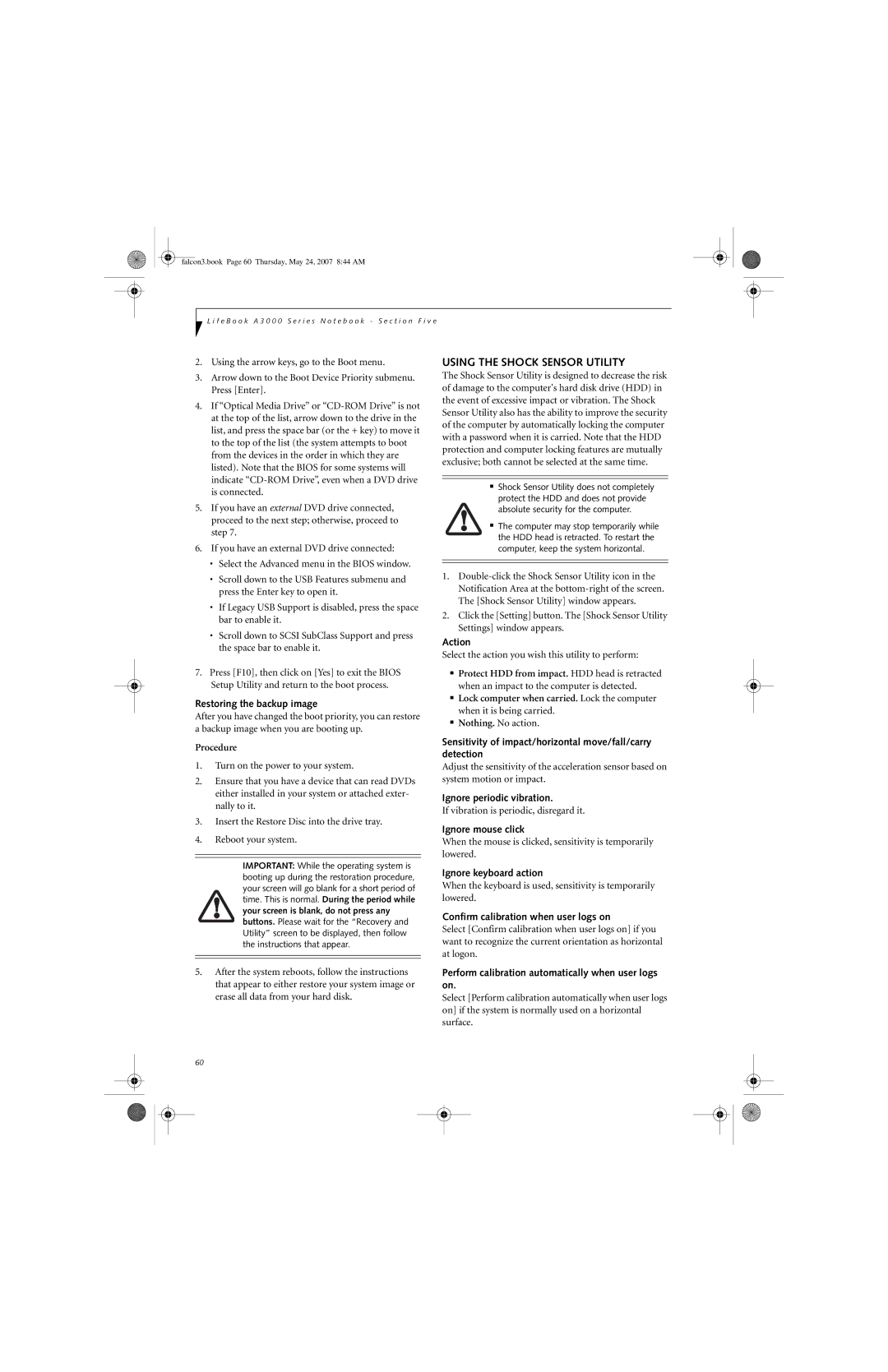
falcon3.book Page 60 Thursday, May 24, 2007 8:44 AM
L i f e B o o k A 3 0 0 0 S e r i e s N o t e b o o k - S e c t i o n F i v e
2.Using the arrow keys, go to the Boot menu.
3.Arrow down to the Boot Device Priority submenu. Press [Enter].
4.If “Optical Media Drive” or
5.If you have an external DVD drive connected, proceed to the next step; otherwise, proceed to step 7.
6.If you have an external DVD drive connected:
•Select the Advanced menu in the BIOS window.
•Scroll down to the USB Features submenu and press the Enter key to open it.
•If Legacy USB Support is disabled, press the space bar to enable it.
•Scroll down to SCSI SubClass Support and press the space bar to enable it.
7.Press [F10], then click on [Yes] to exit the BIOS Setup Utility and return to the boot process.
Restoring the backup image
After you have changed the boot priority, you can restore a backup image when you are booting up.
Procedure
1.Turn on the power to your system.
2.Ensure that you have a device that can read DVDs either installed in your system or attached exter- nally to it.
3.Insert the Restore Disc into the drive tray.
4.Reboot your system.
IMPORTANT: While the operating system is booting up during the restoration procedure, your screen will go blank for a short period of time. This is normal. During the period while
your screen is blank, do not press any buttons. Please wait for the “Recovery and
Utility” screen to be displayed, then follow the instructions that appear.
5.After the system reboots, follow the instructions that appear to either restore your system image or erase all data from your hard disk.
60
USING THE SHOCK SENSOR UTILITY
The Shock Sensor Utility is designed to decrease the risk of damage to the computer's hard disk drive (HDD) in the event of excessive impact or vibration. The Shock Sensor Utility also has the ability to improve the security of the computer by automatically locking the computer with a password when it is carried. Note that the HDD protection and computer locking features are mutually exclusive; both cannot be selected at the same time.
■Shock Sensor Utility does not completely protect the HDD and does not provide absolute security for the computer.
■ The computer may stop temporarily while the HDD head is retracted. To restart the computer, keep the system horizontal.
1.
2.Click the [Setting] button. The [Shock Sensor Utility Settings] window appears.
Action
Select the action you wish this utility to perform:
■Protect HDD from impact. HDD head is retracted when an impact to the computer is detected.
■Lock computer when carried. Lock the computer when it is being carried.
■Nothing. No action.
Sensitivity of impact/horizontal move/fall/carry detection
Adjust the sensitivity of the acceleration sensor based on system motion or impact.
Ignore periodic vibration.
If vibration is periodic, disregard it.
Ignore mouse click
When the mouse is clicked, sensitivity is temporarily lowered.
Ignore keyboard action
When the keyboard is used, sensitivity is temporarily lowered.
Confirm calibration when user logs on
Select [Confirm calibration when user logs on] if you want to recognize the current orientation as horizontal at logon.
Perform calibration automatically when user logs on.
Select [Perform calibration automatically when user logs on] if the system is normally used on a horizontal surface.
